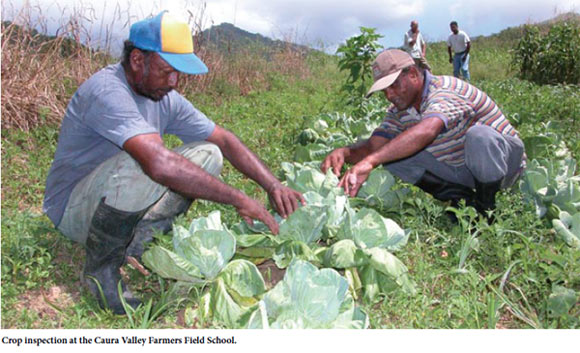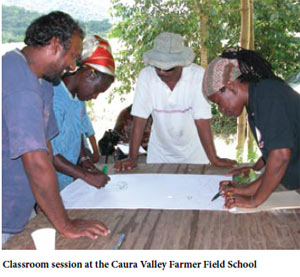 |
 |
 |
|
August 2010
|
Farmers at schoolBy Dr David Dolly
Field Schools occur during the life of the crop. The farmers choose a central location within their community to set up cultivation. The site could be under a mango tree, under a shed on the farm, a rehabilitated harvest site, etc. They would meet on this plot at agreed times throughout the crop’s cultivation. Then comes the big learning bash. Which pests exist? Do these pests face other pests that may easily eat and destroy them? What alternatives are there to expensive and harmful pesticides? Can one use compost as a natural fertiliser? Which crop variety is really better? As with all school environments, the farmers get a chance to share fellowship, mingle with agricultural scientists, extension officers and other stakeholders. They catch up on happenings in the neighbourhood. It’s like making happy school days all over again. Farmers in the Caribbean are eagerly engaging this technique and they always look forward to receiving their certificates of participation at the end. These schools first began among small rice farmers in South East Asia approximately twenty years ago. Although the Asian region is still I became involved when CAB International and the Food and Agricultural Organisation (FAO) invited The UWI to partake in the first field school in the Aranguez vegetable growing area just outside of Port of Spain. This was a great way to help farmers become masters of their own science as it was an opportunity to empower those with a feel for scientific exploration to break down the barriers between scientists and farmers, males and females and even consumers and producers. Ten years hence, this effort rethinks pesticide use and tries to reduce the cost of food. The FFS is an exciting new Extension methodology. Very often the Extension agent cannot educate an entire client base, so a schooling method which multiplies teaching capacity is a welcome innovation. Hopefully the FFS concept will spread more widely among the general citizenry. One could find a method to school other gardeners, landscapists and hobbyists to carefully observe their growing lots in order to understand pest invasions and less harmful ways of controlling the regulars which invade the garden. In the long term this approach would be cheaper, healthier and contribute to a more sustainable environment for future generations. -David Dolly (PhD) is a Lecturer in Agricultural Extension and Deputy Dean (Student Matters) Faculty of Science and Agriculture. Photos courtesy Dr. David Dolly |

 The Farmer Field School (FFS) is an open learning environment in which farmers school themselves in integrated pest management techniques for agricultural food production. Farmers seek to understand the environment in which crops are cultivated in order to find natural pest enemies, alternative and cheaper fertiliser applications and techniques which do not harm the environment, while producing healthier food for consumers.
The Farmer Field School (FFS) is an open learning environment in which farmers school themselves in integrated pest management techniques for agricultural food production. Farmers seek to understand the environment in which crops are cultivated in order to find natural pest enemies, alternative and cheaper fertiliser applications and techniques which do not harm the environment, while producing healthier food for consumers.  responsible for a high percentage of school graduates, there is more widespread adoption of this teaching technique among other small producers worldwide, even livestock producers. Since arriving in the Caribbean in 2000, 40 schools have been conducted in Dominica, St Lucia, Suriname and Trinidad.
responsible for a high percentage of school graduates, there is more widespread adoption of this teaching technique among other small producers worldwide, even livestock producers. Since arriving in the Caribbean in 2000, 40 schools have been conducted in Dominica, St Lucia, Suriname and Trinidad.